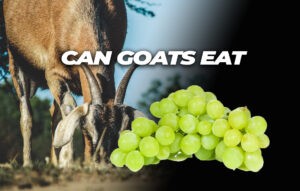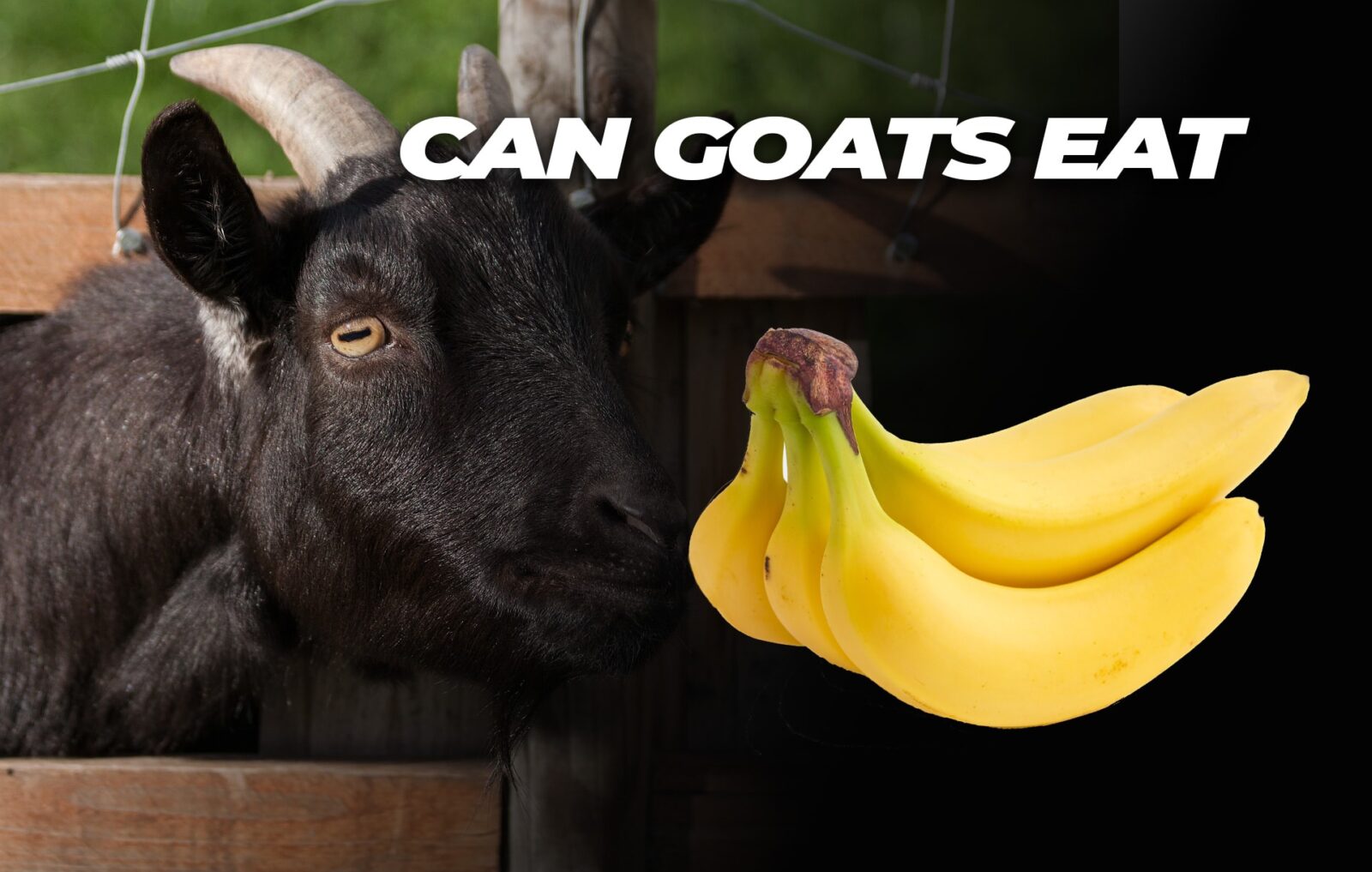Goats will eat virtually anything but will digest only a few of what they eat; therefore, can goats eat grapes? Homesteaders constantly worry about the safety of what they feed their herd, and they are caught between providing adequate micronutrients for their goats and determining which sources of these nutrients are not suitable for their goats to consume.
Grapes are fruits that are packed with some important nutrients that will provide nourishment to goats that consume that, and yes, goats can eat grapes, although in small quantities, as they may cause digestive upset in some goats. Also, they are rich in carbohydrates and can make your goats obese if their consumption is not controlled. Therefore, grapes are better served as nutritional treats for your goats.
In this article, you will realize the importance of grapes in your goats’ diet and how you can safely add them to diets as treats for your goats. You will also get to know the risks involved in feeding your goats with grapes and how you can minimize these risks, all while answering the question: Can goats eat grapes?

Goat Diet and Grapes as treats
As is common knowledge, goats are herbivores but they will readily eat anything they can to survive. While it may seem that they consume different food materials, they are picky eaters and will rather eat grasses, hay, and chaffhaye than any other food choice because they are easier to digest for them.
Their digestive system is quite sensitive and may become upset when new food material is introduced. It is, therefore, important that you ensure that your goats’ diet is rich in water and fiber to ease digestion of food materials and absorption of nutrients. Also, they need these nutrients supplied in the right quantity.
A healthy goat diet should consist of adequate carbohydrates, protein, fats, vitamins, and minerals. However, the ratio of these nutrients to one another depends on the purpose of raising your goats. Meat-producing goats are expected to be fattened to ensure good carcass weight while dairy goats have a diet richer in vitamins and minerals that influence better milk production. It is important to employ a diet that strengthens the immune system of your goats as it helps to reduce your cost of production by almost eliminating disease treatment costs.
Can goats eat grapes?
Goats can eat grapes as they are beneficial to them and provide some important nutrients that may be inadequate in some of the feed choices they have. Grapes are great in supplying water and dietary fiber to your goats, aiding in digestion and improving the strength of their immune system. However, they are lacking in some nutrients and need to be supplied to your goats in little quantity.
Grapes are nutritious fruits, and they are especially high in carbohydrates, causing concern for the sugar content and how they affect weight gain in goats. It is, therefore, important to ensure that you do not feed your goats with excess grapes, even if they are not having enough grains. However, you can employ grains in your goats’ diet as a source of antioxidants and a low-fat, high-carb, and water-rich diet. 100 g of the raw grape contains:
| Nutrient | Composition |
| Carbohydrates | 18.1 mg |
| Fat | 0.16 mg |
| Protein | 0.72 mg |
| Thiamine | 0.069 mg |
| Riboflavin | 0.07 mg |
| Niacin | 0.188 mg |
| Pantothenic acid | 0.05 mg |
| Vitamin B6 | 0.086 mg |
| Folate | 2 µg |
| Choline | 5.6 mg |
| Vitamin C | 3.2 mg |
| Vitamin E | 0.19 mg |
| Vitamin K | 14.6 µg |
| Calcium | 10 mg |
| Maagnesium | 7 mg |
| Phosphorus | 20 mg |
| Potassium | 191 mg |
| Iron | 0.36 mg |
| Sodium | 2 mg |
Benefits of feeding goats with grapes
Due to the nutrients that grapes provide to your goats, they are beneficial to their health and productivity, allowing you to have a lesser production cost and higher profit margin. Some of the benefits your goats can get from being fed with grapes include:
Works as an antioxidant
Every second of your goats’ lives, their body is constantly working, meaning they have to process food materials to produce energy and the output that gives you profit at harvest. This constant biological process is called metabolism and it produces some wastes in the cells of your goats. These wastes, otherwise called toxins, can cause the cells to reduce in their functionality if they remain there. Therefore, they should be constantly removed from the cells.
Grapes contain vitamin C that acts as an antioxidant, helping to remove toxins and free radicals from the cells, consequently improving their functionality and productivity.
Boosts immunity
The degree of a goat’s receptiveness to diseases and infections is determined by the strength of its immune system. While some goats can remain unaffected health-wise and in productivity when they are attacked by some pathogens, others will break down. Usually, a strong immune system means you may have to spend less on treating goat diseases.
Grapes contain nutrients, such as vitamins C and K, that help to boost the immunity of goats, reducing your production cost and increasing your profit. Other nutrients, such as iron, vitamin B6, and magnesium, also play important roles in boosting immunity in goats.
Easy on their digestive system
Goats have a peculiar digestive system. While many mammals digest food by breaking them down in their small intestines and absorbing the nutrients, goats ferment their food materials. Fermentation is a delicate process where if it is accelerated, it produces excess gas that causes bloating. However, because grapes have high water content, they easily digest the grapes and other foods in the rumen.
Also, the introduction of some enzymes that may help with fermentation, as grapes contain some dietary fiber, helps to easily ferment the food materials and control excessive weight gain.
Improves milk production
For dairy goats, they are sensitive to nutrients as a reduction in the required nutrients from the feed they eat quickly influences the quality and quantity of milk they produce. As a homesteader, you don’t want your dairy goats to have a productivity decline, and you don’t want your kids to have insufficient nutrients, especially when they are not weaned.
Grapes contain choline, a nutrient that is important in aiding in the production of milk and stimulating the milk ducts to produce milk for your un-weaned kids and commercial purposes. Choline is not a common nutrient in every food but grapes are some of the few feed options you can get it from.
Improves fetal health
Sometimes, pregnant goats can give birth to abnormally formed kids that may find it hard to survive. They die after some weeks and account for some percentage of feed waste as you have to care for them even though they may not survive. Their abnormality usually stems from poor fetal development and this usually occurs as a result of some nutrient deficiencies during pregnancy.
Some of such nutrients include iron, folate, and choline. They aid in the neural development of fetuses and when they are lacking, kids are born with neural tube defects. Grapes contain adequate quantities of these nutrients and they will help to ensure good fetal health.
Risks of feeding goats with grapes
Feeding goats with grapes in moderation seem to eliminate any form of risk the goats may be exposed to when they consume the fruit. However, there is a possibility that your goats may eat too many grapes, making them experience some adverse effects. The risks attached to feeding grapes to your goats are:
Bloating
When your goats ingest too many grapes, they also have a high amount of sugars in their body, especially the digestive system. This may cause some digestive issues as goats’ digestive systems are particularly sensitive to sugars. The presence of a high amount of sugars may disrupt the normal fermentation process in the rumen, making fermentation proceed too fast and consequently leading to bloating.
You will notice that your goats’ stomachs are swollen and hard. Sometimes, they may have flatulence and may experience unrest. Although their condition will improve with time, it should be avoided by feeding your goats with only moderate grapes.
Excessive weight gain
Also caused by the amount of sugars grapes have, excessive weight gain, is not always beneficial to your goats. While goats raised to produce meat will have good carcass weight on harvest if they have excessive weight, they may have health problems, such as arthritis and cardiovascular issues.
Also, does shouldn’t gain too much weight as it may cause complications during parturition. Therefore, even though grapes contain nutrients beneficial to goats of all ages and sex, they should consume them in moderation.
Can baby goats eat grapes?
The safety of grapes for baby goats depends on their age and how developed their digestive system is. It is, generally, not advisable to feed goats that are not yet weaned with grapes as their digestive systems are not as strong as the adults’ and they are more susceptible to bloating. However, as they advance in age and are closer to getting weaned, you may introduce them to small portions of grapes. You may want to remove the seeds for the kids.
How to feed grapes to goats
Feeding goats with grapes include ensuring that they are fresh and in the right form for different goat ages.
- Wash the grapes and ensure none of them have begun to ferment.
- Slice the grapes and extract the seeds for the kids. You can leave them whole or sliced, without removing the seeds, for adult goats.
- Ensure that you serve grapes to your goats as a treat and not a staple
- Watch your goats closely to observe any abnormal behavior after they have consumed some grapes.
Conclusion
Grapes are nutritious fruits that help to impart some positive health benefits to your goats; however, they must be eaten in moderation, else they may experience some discomfort relating to bloating. Also, they may have excessive weight gain if they consistently consume a more-than-moderate number of grapes.
Improve fetal health and milk production by feeding your goats with grapes.












Leave a Reply